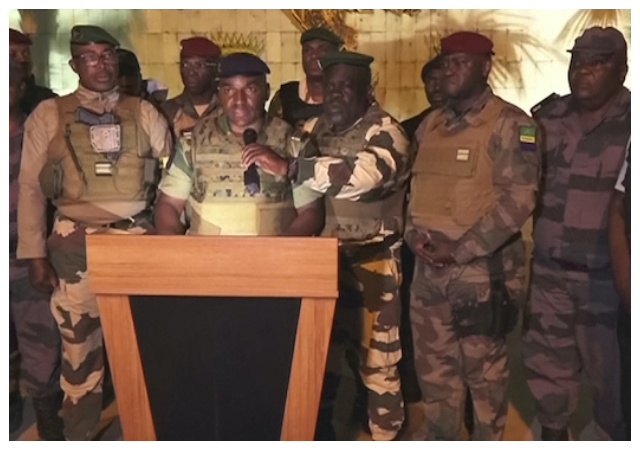
Military officers announced on Wednesday that they had seized control of Gabon, a nation in Central Africa.
They claimed to be nullifying the election results from the previous day, in which President Ali Bongo was declared the victor.
The soldiers identified themselves as members of The Committee of Transition and Restoration of Institutions, saying, “We have decided to defend peace by overthrowing the regime in power.”.
According to the electoral commission, Albert Ondo Ossa, Bongo’s main rival, finished second with 30.77 percent of the vote. Ondo Ossa’s allegations of electoral fraud were denied by Bongo’s team.
Following elections, military officers seized power in Gabon, as evidenced by the following five salient facts.
1. The bongos(Omar and Ali Bongo).
Since gaining independence from France in 1960, the tiny central African nation has been governed by the same family for more than 55 of those 63 years.
In the election on Saturday, 64-year-old Ali Bongo, who had been in office for nearly 42 years, was running for re-election.
When Bongo Senior Omar assumed power in 1967, he had a reputation as a kleptocrat and was one of the richest men in the world thanks to the wealth of Gabon’s oil industry.
His son was once known by his initials ABO, Ali B, or, less flatteringly, “Monsieur Fils” (Mr Son), and grew up as the carefree scion of a wealthy ruling family.
Bongo had a stroke in October 2018 that left him disabled for ten months. The incident fueled allegations that he wasn’t qualified to rule and fueled a small-scale coup attempt.
2. A major producer of oil
Due largely to oil revenues and its small population of 2.3 million, Gabon has one of the highest per capita GDPs in Africa.
The nation found sizable oil reserves offshore in the 1970s, which enabled it to develop a robust middle class and gain the nickname “central Africa’s little emirate.”.
60% of the nation’s income is derived from oil.
But a third of the population still lives below the poverty line of $5.50 per day, according to the World Bank.
3. The “Eden” of Africa
88 percent of Gabon is covered in forests, making it a haven for animals like gorillas, buffalo, panthers, elephants, chimpanzees, and other species.
In a region where wildlife is being harmed by wars, habitat destruction, and the bushmeat trade, the nation, which bills itself as the “last Eden,” has emerged as a leading proponent for conservation.
It established a network of 13 national parks in 2002, occupying 11% of its total area.
The preservation of critically endangered African forest elephants is one of the major success stories. While their numbers have decreased 86% globally in 30 years, they have doubled in Gabon in just 10 years.
4. Hallucinogenic or healing
A substance that has been hailed as a possible cure for heroin and cocaine addiction is made from a potent psychoactive root that can be found in the forests of Gabonese.
The hallucinogenic iboga root has long been used in the ancient “bwiti” ritual, which combines Christian elements with the worship of forest spirits.
High doses can produce anxiety, extreme apprehension, and hallucinations, as well as effects resembling those of LSD, mescaline, or amphetamines.
However, ibogaine in pill form has also been praised for aiding some drug addicts in quitting their habit.
There are now numerous treatment facilities that use the drug in nations like Costa Rica, New Zealand, and the Netherlands.
5. Striking prodigy.
Former Chelsea forward and international for Gabon Pierre-Emerick Aubameyang was once regarded as one of the best strikers in the world.
He moved to Arsenal in 2018, and a year later he shared the Premier League’s top scorer title. He was previously a standout at Germany’s Borussia Dortmund.
Aubameyang moved to Barcelona, then Chelsea, before joining Olympique de Marseille after being relieved of his captaincy at Arsenal due to conduct issues and having his contract ripped up.
AFP.








![Obi Cubana Dance With Joy as His Luxurious Hotel Hosts Prince Harry And Meghan Markle [Video] Obi Cubana](https://www.gistlover.com/wp-content/uploads/2024/05/obi-cubana-prince-harry-mehgan-80x60.jpg)








